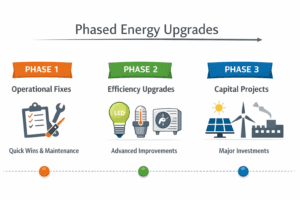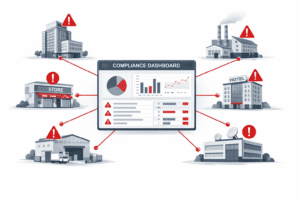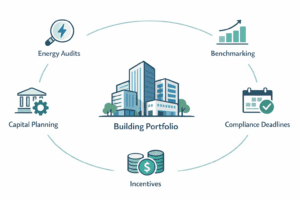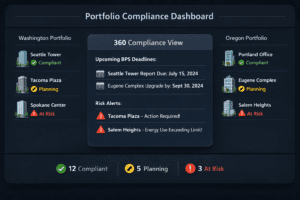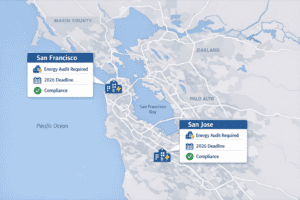Introduction
In the heart of Silicon Valley, San Jose businesses are navigating a landscape that increasingly demands environmental responsibility and energy efficiency. The city’s latest update to the San Jose Energy Audits penalty guidelines marks a significant shift, one that could profoundly impact how businesses operate and manage their energy usage. Understanding the implications of these changes is essential for businesses aiming to remain compliant, avoid financial penalties, and capitalize on the benefits of energy conservation.
Understanding Energy Audits

An energy audit serves as a systematic review of how energy is used within a business, pinpointing inefficiencies and identifying practical solutions to reduce energy consumption and costs. This process typically includes a thorough inspection of buildings, analysis of energy bills, and testing of systems to understand energy flows. The goal is to recommend energy conservation measures that are cost-effective and can significantly reduce energy wastage. For businesses, an energy efficiency audit is not just a regulatory requirement; it’s a roadmap to sustainable operations and potentially substantial cost savings.
Overview of Previous Guidelines
Before the recent updates, the energy audit requirements in San Jose aimed to ensure that businesses were aware of and actively managing their energy consumption. Compliance involved regular audits and the implementation of recommended efficiencies. However, the effectiveness of these guidelines was mixed, with varying levels of enforcement and compliance across different business sectors. The penalties for non-compliance were often insufficient to encourage all businesses to take the necessary steps towards energy efficiency.
What’s New in the Latest Guidelines
The updated guidelines introduce a more robust framework for penalties, which are scaled to ensure they are felt by businesses of all sizes, making non-compliance a less attractive option. The city has also redefined thresholds for mandatory audits, expanding the scope to include a broader range of businesses, including some smaller enterprises previously exempt. A detailed explanation of these changes is available on the San Jose official city website, which provides up-to-date information on all compliance-related requirements.
The Impact of New Penalties on Various Business Sizes
The revised penalties are set to have a differentiated impact across businesses:
– Small Businesses: Often operating with limited margins, small businesses might find the new penalties daunting. The financial burden of enhanced audits and potential fines could strain their resources.
– Medium-Sized Businesses: These businesses might absorb the penalties more readily but will need to strategically enhance their energy audits and conservation measures to avoid recurring fines.
– Large Corporations: With broader resources, large companies may handle penalties more comfortably but face higher reputational stakes. Compliance becomes not only a financial but also a corporate responsibility concern.
Scenarios of potential impacts include small businesses needing to allocate budgets for potential fines, medium-sized businesses hiring energy audit services for compliance, and large corporations overhauling their energy policies to align with new standards.
How to Ensure Compliance
To ensure compliance, businesses should adopt a proactive approach:
- Educate Your Team: Ensure that your staff understands the importance of energy audits and compliance.
- Engage Certified Energy Auditors: Professional auditors can provide tailored services that not only ensure compliance but also help in realizing substantial energy savings.
- Implement Audit Recommendations: It is crucial that businesses act on the recommendations provided in audit reports.
- Maintain Proper Documentation: Keeping detailed records will prove compliance during inspections and can be beneficial in case of disputes.
Possible Benefits of Compliance Beyond Avoiding Penalties
Adhering to energy audit requirements is beneficial beyond just avoiding fines. Compliance can significantly lower energy bills, reduce the environmental impact, and enhance the corporate image in the community. By demonstrating a commitment to sustainability, businesses can attract eco-conscious customers and partners, potentially opening up new markets and opportunities.
What Happens if You Don’t Comply?
Non-compliance can lead to hefty fines outlined in the new guidelines, and the Department of Energy emphasizes the broader implications, including federal penalties and operational disruptions. Additionally, businesses face reputational damage, which can be more detrimental in the long term than the fines themselves.
Preparing for Future Changes

The regulatory environment around energy usage and sustainability is likely to continue evolving. To stay ahead, businesses should monitor regulatory changes and continually adapt their energy management practices. Engaging in forums, workshops, and discussions with industry experts can provide insights and prepare businesses for future regulations.
Conclusion
The revised San Jose Energy Audits penalty guidelines represent a shift towards stricter enforcement and greater accountability in energy management. For businesses, these changes are not just about avoiding penalties but about embracing a culture of sustainability that can drive long-term benefits. By understanding and adapting to these guidelines, businesses in San Jose can lead the way in energy efficiency and environmental stewardship, setting an example for others to follow in the path towards a more sustainable future.
VertPro.com offers tools and services to help property owners and managers improve building energy efficiency and meet regulatory standards. Whether you’re looking for instant pricing on energy audits, need support with benchmark compliance, or want to explore available building upgrade options, VertPro® provides user-friendly technology solutions to simplify the process. Their platform helps ensure adherence to over 60 Energy Benchmarking and Efficiency Laws across the country.
For those looking to improve their property’s energy usage and operational value, VertPro.com provides a diverse array of tools and information. The site aims to facilitate a better understanding of energy efficiency practices and legislation, helping building owners and property managers make informed decisions about their energy strategies while complying with all energy ordinances and laws.
If you’re looking to stay ahead of the curve in building management and ensure your properties meet the future benchmarking laws, we’re here to help. Fill out our contact form [here](), and one of our experts will get in touch to discuss how we can assist you in optimizing your building management strategies for 2025 and beyond.



